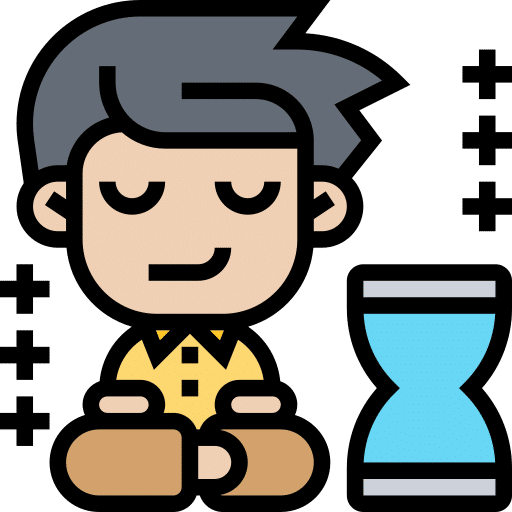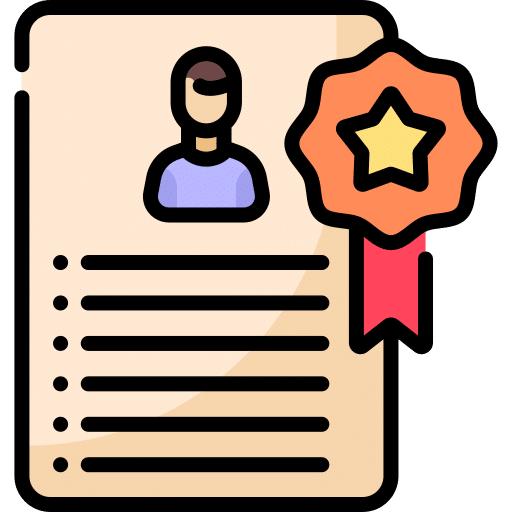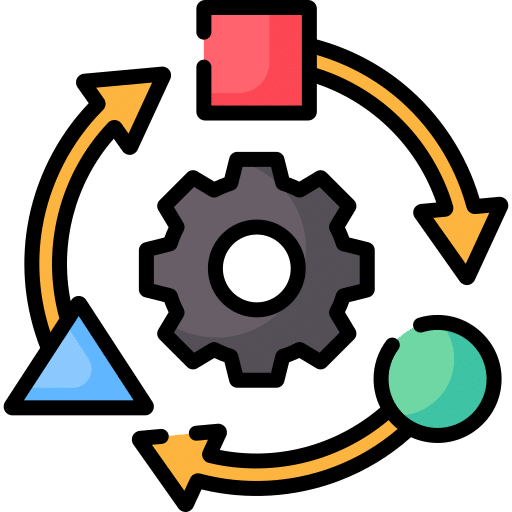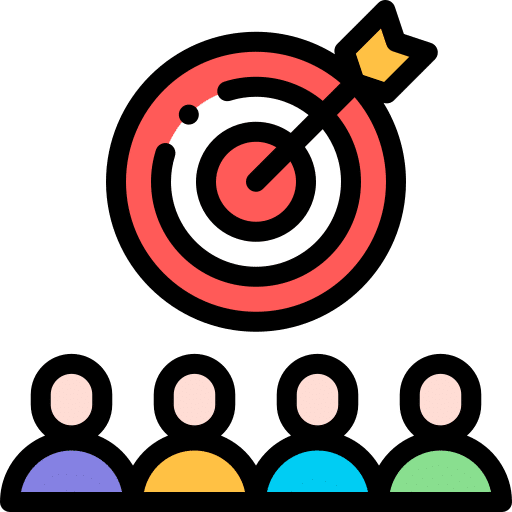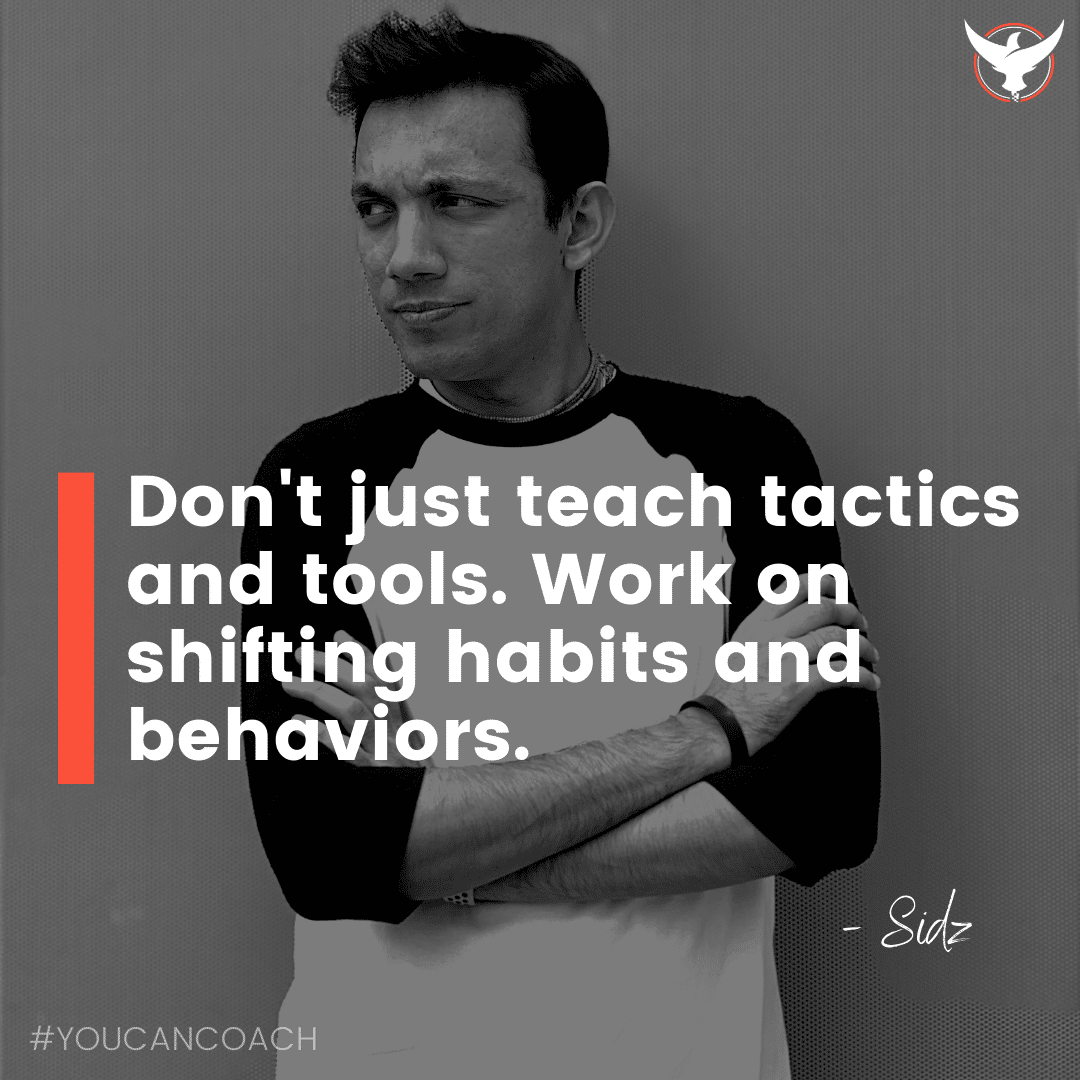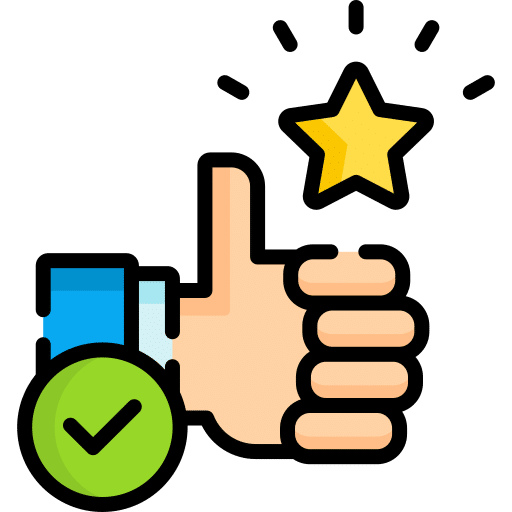The Ultimate Guide to Coach
Consultants
About The Author
Siddharth Rajsekar
Founder - Internet Lifestyle Hub
Siddharth Rajsekar aka Sidz is the founder of the Internet Lifestyle Hub, one of the world’s largest communities for coaches, trainers, teachers, and experts with over 20,000 members.
As an acclaimed lifestyle entrepreneur, Business World's 40 under 40 award winner, and international speaker, Siddharth has trained over 500,000 people in the last 10 years. Recognized as one of India’s leading and sought-after “info-marketing” specialists, Siddharth has worked closely with renowned International experts like Robert Kiyosaki, T Harv Eker, Tony Robbins, Brian Tracy, and Jack Canfield.
After running many multi-million-dollar online campaigns for companies and helping people make money online in the last 10 years, Siddharth has developed and perfected the Freedom Business Model. The Freedom Business Model focuses on helping people take their expertise online and building a super-profitable digital coaching business, without an office or employees.

His mission is to reform the education and employment system by building a new breed of Digital Leaders, based on the core principles of humanity and simplicity and by enhancing one’s social skills, happiness, and overall productivity.
He is the author of this book, “You Can Coach” which decodes all the steps for experts to successfully PLAN, LAUNCH, and GROW a digital coaching business to six figures a month. Wearing multiple hats, Siddharth is a husband of a loving wife, a father of 2 boys, a minimalist, futurist, spiritualist, a YouTuber who has published over 300 videos, as well as a podcast host!
1. Are You Cut Out To Coach Consultants?
A consultant is a person who's an expert in a particular field and gives professional advice to individuals and businesses in their areas of expertise. Accordingly, becoming a coach for consultants requires a higher level of expertise to be effective and provide value to clients.
Apart from expertise in a certain field, a coach requires a unique combination of personal qualities, skills, and knowledge. Coaches must have empathy, strong communication skills, a positive attitude, patience, flexibility, expertise, and professionalism to be effective.
There are many different types of consultants, each with a unique focus and set of skills. When we hear the term "consultant," we first think of the most conventional types: management consultants, IT consultants, marketing consultants, financial consultants, HR consultants, and legal consultants.
Management consultants:
Management consultants work with organizations to improve their performance and effectiveness. They may offer advice on strategy, organization, operations, and other aspects of business management. This helps reduce costs, increase business efficiency, or improve company productivity.
Financial consultants:
Often, small businesses don’t have the need or budget to hire a full-time finance manager and require a professional financial consultant to fill in the gap. Financial consultants help their clients with their financial planning, investment decisions, and tax strategies. They may also help clients with retirement planning, estate planning, and risk management.
Marketing consultants:
Marketing consultants: Marketing consultants help organizations develop and implement effective marketing strategies. They may provide advice on brand positioning, market research, product development, and advertising.
IT consultants:
Organizations need IT consultants for their technology needs and to receive advice on software, hardware, and other IT-related topics. They may help clients with software selection, network design, and security. Since IT and technology consulting is a technical field, those in this line of work have educational backgrounds in computer technology.
Human Resources consultants:
Human resources consultants help organizations with their staffing and personnel needs. They may offer advice on employee relations, compensation, benefits, and other HR-related topics.
Legal consultants:
Legal consultants provide advice and guidance on legal matters, such as contracts, disputes, and regulatory compliance. They may also help organizations navigate the legal aspects of mergers and acquisitions.
All these professions would require professional degrees, but often it comes down to your work experience. Your degree, diploma, or certificate is often less important than your experience and your drive to learn.
Social Media consultants:
Social media consultants: This is a relatively recent field within the larger marketing sector. A social media consultant helps a company drive potential clients to its website using social media networks. Social media consultants are frequently self-made or have obtained their knowledge through work. Because social media algorithms are continuously changing, anyone interested in working in this field should keep their finger on the pulse of each platform. In other words, they must stay current on the latest upgrades and plans.
SEO consultants:
People who run SEO consultancies have expert-level knowledge of search engines and how to help their clients’ websites and content rank. SEO consultants are often hired to help grow traffic, backlinks, and the domain authority of a brand’s website. This is very important for businesses that operate in the digital sphere as they work to beat out their competition.
Design consultants:
If you are in the creative field, you can help bring the aesthetic and personality of a brand to life. Whether responsible for the look of physical spaces or digital ones, design consultants will have a deep understanding of color, shape, and texture.
Fitness consultants:
Fitness consultants are so much more than personal trainers. They often have degrees in nutrition or sports science. Generally speaking, wellness consultants need to hold a certificate in their specialty, be it nutrition, personal training, or health coaching.
PR consultants:
PR consultants can help extend the reach of a company’s presence and improve the public’s view of a company. They help shape what people think about a business’s products or services, employees, or ownership. PR consultants usually write and pitch press releases, build campaigns, work with media and influencer partners, conduct or set up interviews, etc.
Image consultants:
A large number of people are seeking help developing a personal style in their dress and grooming, and are willing to pay an image consultant for it. This trend probably started with the use of personal stylists by celebrities, but it is now a sought-after service for everyday people.
If you are coaching consultants, you will be helping them to improve their own performance. You will be helping them learn by working together to discover the solutions to their difficulties.
Coaches come from a variety of backgrounds and can specialize in areas such as business, leadership, social media, fitness, and more. Regardless of the area of focus, there are several key qualities and skills essential for success as a coach.
Integrity is crucial for a coach, as it builds trust with clients. A coach who acts honestly and transparently always demonstrates reliability and dependability. Mutual trust strengthens existing relationships, leading to a positive reputation in the industry.
The difference between an average and a great coach is their ability to simplify concepts. You need to be:
Driven by a mission
Openly share knowledge
Have a unique point of view
Have the freedom of time and location
Adapt to growing knowledge
No matter what you’re interested in, there’s a type of coaching out there for you. Simply put, coaching is all about helping others. Yet this is a demanding profession that requires a unique blend of personal qualities, skills, and expertise.
To be an effective coach, one must possess the following key qualities:
Knowledge:
Coaches must have a deep understanding of the subject they are coaching, whether it is sports, business, or any other discipline. They must be knowledgeable about the latest trends and developments in their field and be able to apply this knowledge to their coaching practice. Your teaching is not a newspaper. Share concepts that stand the test of time.
Experience:
To be an effective coach to consultants, it is important to have a deep understanding of the area you are coaching in. This can be gained through education, training, and real-world experience. For example, a business coach may have a background in entrepreneurship, management, or finance. A sports coach may have played the sport at a high level and have experience coaching teams.
Empathy and Active Listening:
A coach's ability to connect with clients and understand their needs is crucial to success. This requires strong emotional intelligence and the ability to actively listen to clients, identify their goals, and help them develop a plan to achieve them. A coach must be able to understand the feelings, thoughts, and experiences of their clients. This requires the ability to put oneself in someone else's shoes and respond to their needs with compassion and understanding. Effective coaches can listen attentively to their clients. This helps them to understand the root causes of any challenges their clients are facing and to provide guidance and support.
Communication Skills:
Effective communication is critical for coaches, as they need to be able to clearly articulate their thoughts and ideas to clients. This includes the ability to ask clarifying questions, provide feedback, and help clients understand complex concepts. A coach must have strong communication skills, both verbal and non-verbal. They must be able to express themselves clearly and concisely, while also being able to listen actively and interpret the messages of others.
Adaptability:
Coaching is a dynamic and ever-changing field, and coaches need to be able to adapt to new challenges and situations. This requires the ability to think creatively and outside the box and to be flexible in their approach. Coaches must have a positive outlook and encourage their clients to do the same. They must maintain a can-do attitude and inspire their clients to achieve their goals, even in the face of adversity.
2. Creating A Curriculum
As a coach, your mission is to help clients achieve their goals by providing them with valuable insights and guidance. To achieve this, it is important to have a well-structured curriculum that covers all the key aspects of the coaching process.
Creating a curriculum can be a complex and time-consuming task, but it is an essential step for ensuring the success of your coaching business. A well-designed curriculum will help you achieve your coaching goals and provide a structured framework for your coaching sessions.
People don’t buy products or courses. They buy a better version of themselves. When you design a curriculum that shows them a mirror and then the path, they will be in a better position to decide whether to buy your course. Simplifying this journey with a dash of fun is the recipe for success.
Define Your Coaching Goals:
Before you start creating your curriculum, it is important to define your coaching goals. This will help you determine the content and structure of your curriculum. For example, if your goal is to help your clients achieve their personal or professional goals, you might want to include a section on goal-setting and action planning.
Determine Your Target Audience:
Understanding your target audience is critical for developing an effective curriculum. Knowing who your clients are and what their needs are will help you tailor your curriculum to meet their specific requirements. For example, if you are coaching business executives, you may want to include a section on leadership development.
Consider Relevant Topics:
Consider Relevant Topics: Consider the topics that are most relevant to your clients and your coaching goals. If you are coaching clients who are looking to improve their communication skills, you might want to include a section on active listening, assertiveness, and non-verbal communication.
Creating an effective curriculum for your consultant coaching business takes time and effort, but it is well worth it in the end. By following these steps, you will be able to create a structured and effective curriculum that will help you achieve your coaching goals and provide value to your clients.
Consultants are experts in their chosen field who need guidance in certain aspects. Coaches can help consultants improve their performance, stay motivated, and achieve their goals more effectively.
The respect that they give their coach is because:
This person inspires me
This person teaches me
This person makes me think
This person understands me
In today's fast-paced and constantly evolving world, it's important to keep up with the latest trends and techniques in your field. Whether you're a student or a seasoned professional, continually updating your knowledge and skills is crucial for success. One effective way to do this is by modeling your curriculum after the best in your field.
Here are some steps you can follow to create a curriculum that will help you stay ahead of the curve:
Identify the top experts in your field:
Start by researching the individuals and organizations that are recognized as leaders in your area of study or work. This could be through an online search, attending conferences, or asking for recommendations from your peers and mentors.
Study their work and approaches. Read their books, articles, and other publications, as well as watch their presentations and talks. Take note of their unique perspectives and methodologies, and consider how you could apply them to your work.
Create a list of key concepts and skills:
Based on your research, identify the most important concepts and skills that are crucial for success in your field. This could include specific tools, techniques, or theories that are widely used and highly regarded.
Develop a customized curriculum:
Use the information you've gathered to create a customized curriculum that incorporates the key concepts and skills you've identified. Consider incorporating a mix of traditional coursework, hands-on projects, and real-world experience to ensure you have a well-rounded education.
Continuously evaluate and update your curriculum:
The field of your expertise is constantly evolving, so it's important to regularly evaluate and update your curriculum. This could involve taking new courses, attending workshops and conferences, or participating in other professional development opportunities.
Modeling your curriculum after the best in your field can help you stay ahead of the curve and continually improve your skills and knowledge. By doing so, you'll be better prepared for success in your career and equipped to tackle the challenges of tomorrow. Study how they have structured their programs. Learn how they are framing themselves in their videos. If you need to invest in their programs, go and do that. Once you invest in their programs, you’ll get a lot of ideas on precisely what they are doing to achieve that kind of success. All you must do is wear the hat of a researcher. Make a list of all the points that make their business work and start to model them. You can have many role models; some of them would have good websites, and some of them would have good funnels. Some of them would have great quality video production, and some of them would have a great customer experience when you bought their product. Some of them would have a great support system within their community. Just go and analyze all of them. If you must spend a whole week doing this, just do it.
Creating a framework for your curriculum
Your framework should include the following elements:
Introduction: This should provide a brief overview of the coaching process and what clients can expect from your program.
Assessment: This should include tools and techniques to assess your client's current situation and help them determine their goals.
Skill Building: This should cover the key skills and strategies needed to achieve their goals, such as communication, problem-solving, and goal-setting.
Action Planning: This should help clients create a plan of action for achieving their goals and provide support for staying on track.
Evaluation and Reflection: This should include tools and techniques for evaluating progress and reflecting on what has been learned.
Develop the Curriculum
Once you have created a framework for your curriculum, you can start developing the content. When developing the content, consider the following:
Keep it simple: Your clients should be able to easily understand the information you provide.
Use real-life examples: Clients are more likely to retain information if they can see how it can be applied to their own lives.
Make it interactive: Encourage clients to actively participate in the coaching process by incorporating activities and exercises.
Be flexible: Be open to making changes to your curriculum based on feedback from clients.
Evaluate and Refine Your Curriculum:
Finally, it is important to regularly evaluate and refine your curriculum to ensure that it meets the needs of your clients. Ask for feedback from clients and make changes as needed to ensure that your curriculum remains effective.
Put together a small survey asking them what they want to learn. As soon as anyone opts for your course, ask them what their biggest challenges are and where they are right now in their business. The responses to that survey are very valuable, as the data gives many insights on how to give the best customer experience to your students. It will become your biggest competitive advantage, as you will be mining data internally. If you focus on delivering the data, you will be far ahead of the competition.
Incorporate Different Techniques:
To keep your clients engaged and motivated, it is important to incorporate different techniques into your curriculum. This can include interactive activities, case studies, role-playing exercises, and reflective journaling.
Introduce a challenge to give your students a results-oriented breakthrough within 30 days. This will allow them to evaluate whether the curriculum is solid and will get them to incorporate your teachings into their daily routine. This is where you get them to learn all the essential skills and practice them daily. Since this is a challenge, it will also put positive pressure on your students to follow through and make things happen.
Regular review and revision:
Your curriculum is not set in stone, and it should be regularly reviewed and revised to ensure that it is up-to-date and effective. Create a system that can help clients have an active routine. These actions need to be simple, doable, measurable, and achievable. Give clients the templates and frameworks that they need to fit into their action plans. This will help you identify areas for improvement and make any necessary changes to keep your curriculum relevant and effective.
3 How Much Can You Earn As A Coach To Consultants?
As a coach, determining your fee can be a challenging task. You want to be fair to yourself and your clients, but you also don't want to set a rate that's too high or too low. The earning potential for coaches for consultants is high, but it requires effort and dedication to build a successful business. As you gain experience and expand your services, you can expect your earnings to grow. With the right approach, you can build a thriving coaching business and earn a great income.
Grow your business with logic and love. Strategy in your head. Mission in your heart.
The deeper you work on yourself, the wider your impact will be.
Your quiet intentions are louder than the words you speak.
If you treat coaching like a hobby, it will treat you like a hobby in return. Don't make the mistake of giving away your expertise for free because you're in the knowledge business. You would be doing yourself a disservice. People who spend money on your course will pay more attention. People who pay attention, act. And people who act, get results. So, it’s your moral responsibility as a consultant coach to charge people money for your courses, only then will they value your information. Only when there’s a value exchange will people value your knowledge.
What’s worthwhile usually doesn't come easy. What comes easy is usually not worthwhile.
There is a compound interest even in your efforts. The universe will test your capabilities and consistency.
Stick to one thing long enough, and you will reap the reward.
One of the efits of being a consultant’s coach is that you have the flexibility to choose your clients and projects, allowing you to focus on those that offer the best ROI. You can maximize your income and increase your ROI by working with high-paying clients and projects.
In addition to client selection, the pricing model you choose can also impact your ROI. For example, if you charge a premium rate for your services, you can expect a higher ROI compared to charging lower rates. However, it’s important to ensure that your pricing is competitive and aligned with the value you offer your clients.
If you are playing a game where you’re competing on price, you have already lost the game. There must be a value exchange in terms of money, time, energy, or effort for your business to grow. If you want to achieve any kind of result as a digital coach, you need to think in terms of investments and ROI.
Market Rates:
Research the going rate for coaches in your industry. Take into account your experience, credentials, and niche. If you are just starting, you may want to charge less than established coaches but don't undervalue your time and expertise.
Target Clientele:
Consider the type of client you want to attract. If you are targeting high-end clients, your fee should reflect that, while if you are targeting clients on a budget, you may want to consider a lower rate.
Time and Effort:
Consider the time and effort you put into coaching. How much time do you spend preparing for sessions, following up with clients, and creating materials? This should be reflected in your fee.
Experience and Credentials:
Your experience and credentials can impact your fee. If you have years of experience and multiple certifications, your fee should reflect that.
Value Proposition:
Consider the value you bring to your clients. What sets you apart from other coaches? How do you help your clients achieve their goals? This should be reflected in your fee.
What people want is a clear-cut path to achieving their goals, and they want it fast. What people will pay you for is not the volume of information, but how simple you can make it for them and how fast you can get the results.
Maximizing your ROI as a consultant’s coach requires careful consideration of factors such as client selection, pricing, and operating expenses. By choosing the right clients, pricing your services competitively, and being efficient with your time and resources, you can increase your ROI and build a successful coaching business.
As a coach to consultants, your earnings will depend on various factors, such as your experience, the market demand for your services, the type of clients you work with, and your billing rate. A coach can expect to earn between ₹ 1. 9 lakhs and ₹ 7.5 lakhs when they first start. If you have specialized expertise or have built a reputation in a specific industry, you can expect to earn even more. However, as you build your reputation and portfolio, some high-end consulting coaches may be able to charge premium rates, as high as ₹ 8.8 lakhs.
In addition to hourly rates, coaches to consultants can also earn income through retainer agreements, where clients pay a set fee for ongoing support and access to your expertise. This can provide a stable and predictable stream of income.
Another way to increase your earnings as a coach is to expand your services. This can include offering workshops, training programs, and other related services. By offering a wider range of services, you can increase your income and attract a wider range of clients.
Delivering more value to clients is an essential aspect of building a successful business. It can increase client satisfaction, build trust, and drive repeat business.
Here are some strategies for delivering more value to your clients:
Understand their needs:
Start by understanding what your clients need and what their goals are. Ask them about their challenges and what they hope to achieve. The more you understand their needs, the better equipped you will be to deliver value.
Offer personalized solutions:
Tailor your services and products to meet your client's unique needs. This shows that you are invested in their success and helps to build trust and credibility.
Provide exceptional customer service:
Offer prompt and friendly service, and make sure that you are easily accessible. Respond promptly to any questions or concerns, and go the extra mile to make sure your clients are satisfied.
Stay ahead of the curve:
Keep up to date with the latest developments in your industry and find ways to incorporate new technologies and techniques into your services. This will help you stay ahead of your competition and offer your clients a better, more innovative service.
Offer value-added services:
In addition to your core services, consider offering value-added services that will benefit your clients. For example, you could offer training sessions or provide helpful resources and tools. Another way to increase your earnings as a consultant’s coach is to expand your services by offering workshops and training programs.
Keep in touch:
Regular communication is key to building strong, lasting relationships with your clients. Make sure you stay in touch regularly and check in to see how they are doing. This will help you stay top of mind and make it easier to identify new opportunities to deliver value.
In conclusion, delivering more value to your clients is a key aspect of building a successful business. By understanding their needs, offering personalized solutions, providing exceptional customer service, staying ahead of the curve, and offering value-added services. Coaching can be a challenging career, but with the right approach, it is also highly rewarding. By effectively managing their time, managing expectations, dealing with ambiguity, maintaining work-life balance, being adaptable, and staying up-to-date, a coach can overcome the challenges of their job and achieve success in their career.
Ultimately, the fee you charge as a coach should reflect the value you provide to your clients. Don't be afraid to charge what you're worth, but also be flexible and open to negotiation if necessary.
Determining your fee as a coach requires a balance of several factors, including market rates, target clientele, time and effort, experience, and your value proposition. Consider these factors carefully to set a fair and reasonable fee that reflects the value you provide to your clients.
If you have specialized expertise or have built a reputation in a specific industry, you can expect to earn even more. In addition to hourly rates, coaches can also earn income through retainer agreements, where clients pay a set fee for ongoing support and access to your expertise. This can provide a stable and predictable stream of income.
The earning potential for coaches is high, but it requires effort and dedication to build a successful business. As you gain experience and expand your services, you can expect your earnings to grow. With the right approach, you can build a thriving consulting coaching business and earn a great income. The key is to think long-term, not short-term. If you can give a customer experience where the customer feels that they’re getting 10 times what they’ve paid for, that’s what matters.
The price point depends on your target market and the value that you provide, as well as the value that you believe you're providing for somebody.
Just being a coach is not good enough. You have to be a good marketer because you need to market yourself. Many coaches are great at what they do, but because they don't like marketing, their income level is capped at a very low level.
As your customer base grows, the feedback that you get from your customers will start to give you dynamic input on what you need to do next.
You need to serve your community to become the ultimate expert. You don’t have to be the foremost expert when you get started.
You will end up becoming the leading expert the more you welcome feedback and the more you keep working on yourself. You are the coach, the consultant, and the guiding light for the marketplace. You are the one who’s doing the research, and you’re giving them the insights.
“The deeper you do research, the simpler you can make it for your students.” - Sidz
This is a profitable business, and the best thing about it is that you can be self-educated and perform and coach well. As long as you put in the hard work and have confidence in yourself, you can reach greater heights. The online consultation market offers unbelievable possibilities, so if you have the belief in your abilities and push yourself to be an expert in the field, you can be earning for years.
Yes, it takes a lot of studying, mastering, patience, determination, and self-confidence. But with enough confidence, it will take you further than you imagine. You can be your own boss with your own company, and that means a free lifestyle. You’re not just making money for your expertise, you’re earning what it’s worth to change someone’s life!
Instead of pricing your consulting by the hour, charge according to results. Tell people what problems you will solve and what needs you will help them fulfill.
After working with a few batches, you’ll get a better feel for how much time and work it takes to complete your course to their satisfaction. At this point, you can adjust your prices higher or lower to find the right balance between the value offered and the fees charged.
You probably have enough material to create multiple courses. Aim at creating three levels, or packages. Each level should offer different results, tools, and resources, at progressively higher charges. Target each package at different levels of need.
Profitability in the coaching business is all about adapting to and understanding demand and supply in the market. Only when there’s potential in the market can that be converted into payments and profits. If you can give a solution to a big demand in the market, to a narrowed down segment in society, that segment will be willing to pay any price to solve their problem.
When this happens, you get paid. And when you get paid consistently, you have the ability to plough the revenues back into your business to make it more and more profitable. This is a point that a lot of people miss. A lot of “experienced trainers and coaches” also miss this point. They get stuck with a model that used to work and are not quick to adapt to changing times.
When you’re able to communicate why you do what you do, people will be able to connect with your core. And that is so much more powerful than just telling people about what you do. Communicating with your audience about the reasons why you do what you do, will give you a different sense of potency than just talking about your products. That’s why crafting a mission statement is the most powerful ingredient in the whole niche crafting process.
Commitment means commitment in both directions. The first step towards getting commitment is ensuring that you commit yourself right back to your clients. Get clear about your intentions for working together and make sure they're aligned before you begin coaching sessions. You might also want to ask for a commitment from your client.
Matthew Kelly, author of the best-selling book "The 4-hour work week" says it best;
"If you're in business to make money, then there are really only three questions you need to ask yourself. What do I want? What do my customers want? How do I deliver that?"
"Who is qualified to coach and mentor me and can help me attract clients?" is a different question from: "How much should I charge for my coaching services". The first question will lead your business towards the ability to pay others - meaning if you want to be able to afford a qualified mentor or coach, you must have enough clients generating revenue consistently so they can share their time with someone else who also needs help.
GO DIGITAL
This is the best time in the history of the world for you to be able to monetize your knowledge by becoming a great coach.
YouTube is the second-largest search engine globally, and people are spending more time on YouTube than even on Google. YouTube has become the preferred long-term channel to build your online presence, especially if you're a knowledge provider. If you're somebody who knows what to give out to the world, this is the place where you can be discovered. If you’re a native English speaker and can produce good content, you’re at a huge advantage. In India, YouTube is now available in Gujarati, Kannada, Malayalam, and Telugu as well.
Podcasts can be downloaded and listened to anywhere at almost any time, which is a huge plus. Since it is unisensory, your audience could be listening to you as they work out, drive, or cook. Your podcast audience will self-select you and think of you as an authority on your topic. You have a powerful influence on people who are more willing to learn. Listeners of podcasts are found to be very serious and receptive.
Influence is the "currency" of the digital age. Consultants will be able to impact more people if they have the power to influence them to create positive change in the world.
Online video or podcast presenters need to speak well because their success depends mainly on how well they can communicate with their audience. Here are some reasons why talking well is important for online presenters:
Online video or podcast presenters need to speak well because their success depends mainly on how well they can communicate with their audience. Here are some reasons why talking well is important for online presenters:
Engagement:
Speaking well helps presenters engage their audience by making their content more interesting and compelling. A presenter who speaks articulately, and with enthusiasm can capture the attention of their audience and keep them engaged throughout the video or podcast.
Credibility:
Speaking well also helps presenters establish credibility with their audience. A presenter who speaks confidently and knowledgeably about their subject matter can build trust with their audience, making it more likely that they will return for future videos or podcasts.
Branding:
For online video or podcast presenters who are building a personal brand, speaking well is essential. A presenter's communication style can be a key component of their brand, and a presenter who speaks well can differentiate themselves from others and build a following.
Accessibility:
Clear and effective communication is essential for ensuring that the presenter's message is accessible to as many people as possible. A presenter who speaks clearly and concisely can make their content more accessible to people with different language backgrounds or hearing impairments.
Podcasts can be downloaded and listened to anywhere at almost any time, which is a huge plus. Since it is unisensory, your audience could be listening to you as they work out, drive, or cook. Your podcast audience will self-select you and think of you as an authority on your topic. You have a powerful influence on people who are more willing to learn. Listeners of podcasts are found to be very serious and receptive.
The outcome of digital coaching is beneficial and valuable for anyone who wants to grow their customer base. Technology helps a coach solve the everyday challenges of clients. As a coach, help your clients learn from case studies of actual scenarios and improve.
Going digital in your coaching can potentially increase your income in several ways:
Increased reach:
By offering your coaching services online, you can reach a wider audience beyond your local area. This can increase your potential client base and allow you to serve clients from all over the world.
Reduced overhead costs:
Going digital can reduce your overhead costs as you don't need a physical location to conduct coaching sessions. This can lead to increased profitability as you don't need to spend money on rent, utilities, and other related expenses.
More efficient use of time:
Online coaching can be more time-efficient for both you and your clients, as there's no need to travel to a physical location. This can allow you to take on more clients and increase your income.
Diversified income streams:
Going digital can allow you to diversify your income streams by offering different types of coaching services, such as one-on-one coaching, group coaching, webinars, and online courses. This can provide more opportunities for clients to engage with you and increase your overall income.
Scalability:
Online coaching allows you to scale your business more easily, as you can serve multiple clients simultaneously through webinars and online courses. This can enable you to reach more clients without having to sacrifice the quality of your coaching services.
Overall, going digital in your coaching can help you increase your income by expanding your reach, reducing your overhead costs, providing more efficient use of your time, diversifying your income streams, and enabling scalability.
A huge advantage of going digital is that interactive discussion forums, personal mentors, etc., become possible. This would not exist without larger audiences taking part in the course material. For an institution to cater to larger audiences, this naturally means larger amounts of investment in the subject matter and community at hand, which may be unaffordable. However, an individual digital coach does not have to invest money in the physical space. As a coach, you focus on market presence using technology.
4. A Day In The Life Of A Coach
A day in the life of a coach can be varied and demanding, but also extremely rewarding. There needs to be a combination of client interaction, teamwork, analysis, and problem-solving that makes the role both challenging and fulfilling. Whether working on short-term projects or long-term engagements, coaches play a vital role in helping consultants improve their operations and achieve their goals. They provide expertise and guidance to clients in a wide range of industries, making it essential for them to have a well-structured routine to manage their time and tasks efficiently.
Bearing in mind all the different tasks a coach needs to take care of, here's what a typical day might look like
7 a.m. to 10 a.m: First things first, as a coach, it's crucial to start the day with a positive mindset. So, always begin the day with some form of exercise, meditation to energize and focus the mind. or positive affirmations to set the tone for the day ahead. This helps you stay focused and energized throughout the day. Review emails, prioritize tasks, and make a to-do list for the day ahead.
10 a.m. to 11.30 a.m. After the morning routine, a coach would typically dive into their coaching schedule. This involves working with clients one-on-one, conducting group coaching sessions, or facilitating training programs. As a coach, your job is to help individuals and organizations achieve their goals, overcome challenges, and maximize their potential. This involves a lot of active listening, asking powerful questions, and providing guidance and feedback.
11.30 a.m. to 1.00 p.m. In between coaching sessions, spend the time preparing for upcoming sessions, researching new coaching techniques, and staying up-to-date with industry trends and best practices. This involves attending seminars and conferences, and networking with other coaches and experts in your field.
1.30 p.m. to 3.00 p.m. Make time for marketing and business development activities. Reach out to potential clients, build relationships with existing clients, and promote your services through various channels such as social media, email marketing, and public speaking engagements.
3 p.m. to 7 p.m. Group Coaching/ Individual Coaching. Building a strong relationship with the consultants is essential for effective coaching. Take the time to get to know them, understand their goals, and what they hope to achieve. This will help you tailor your coaching to their specific needs and style, and create a comfortable environment where they feel safe to share their work and ask for feedback.
7.00 p.m. onwards In the evenings, coaches spend time reflecting on the day's coaching sessions, reviewing client progress, and planning for future sessions. It's also important to take some time for self-care and relaxation, whether it's spending time with family and friends, pursuing hobbies and interests, or simply taking a break to recharge.
A coach is an individual who provides expert advice to help consultants improve their performance. For them to achieve better results, several steps can be taken.
Specialize in a Niche: By specializing in a specific industry or business area, a coach can become an expert in that field. This will enable them to provide more valuable advice to clients and increase their chances of success. When you go into a micro-niche, you’ll realize that there’s so much work that you can do that specialty itself.
Stay Current with Industry Trends: Staying current with industry trends and developments is crucial for a coach to stay relevant and provide the most up-to-date advice to clients. This can be achieved by attending industry events, reading industry publications, and staying in touch with other professionals in the field.
Build Strong Relationships: Building strong relationships with clients is key to success as a coach. By establishing trust and rapport, they can better understand their clients' needs and provide tailored solutions to meet those needs.
Develop a Process: Having a clear and structured process for delivering results is important to being be effective. This can involve defining project goals, outlining steps to be taken, and tracking progress throughout the project.
Collaborate with Clients: Collaborating with clients can lead to better results as it ensures that their needs and perspectives are taken into account. This can also help to build trust and ensure that the solution is tailored to the client's unique needs.
Continuously Evaluate and Improve: Coaches should regularly evaluate their performance and identify areas for improvement. This can involve seeking feedback from clients and evaluating the results of projects to identify areas for improvement.
Your customer base is directly proportional to your mindset.
Coaching consultants can be a challenging and demanding career, but with the right approach, it is also highly rewarding. Here are several ways a coach can cope with the challenges of their job:
1. Time Management: Coaches often have multiple projects and deadlines, which can make it difficult to manage their time effectively. To cope with this, it is important to prioritize tasks, create a schedule, and stick to it as much as possible
2. Managing Expectations: Coaches must manage their clients' expectations and ensure that they deliver results in a timely and effective manner. To do this, it is important to set clear goals, communicate regularly with clients, and manage their expectations throughout the project.
3. Dealing with Ambiguity: Coaching consultants often involves a high level of ambiguity, as they are often tasked with finding solutions to complex problems. To cope with this, it is important to have a structured approach to problem-solving and to be comfortable working in an environment where the outcome is uncertain.
4. Adaptability: Coaches must be adaptable and able to work in different environments and with different clients. To do this, it is important to be open to new ideas and approaches and to be flexible in one's thinking and problem-solving methods.
5. Staying Up to Date: The coaching industry is constantly evolving, and coaches must stay up-to-date with the latest industry trends and developments. This can be achieved through ongoing education and professional development opportunities.
5. The Best Tools To Use
There are three concepts to follow before choosing a tool.
Choose The Best
Don't just pick a tool because it's cheap. "Don't be cheap on your journey to greatness." You want to be great. Don't be cheap. In other words, just because the tool is cheaper, don't pick it. Pick what is best, pick something that has great customer support, and pick something that has been built for that purpose.
Aim For Mastery
It is not about the tool. It is about how you use the tool. For example, Photoshop is a tool. Anyone can download Photoshop, but how you design and how you aesthetically use the tool are going to determine the results. You've got to aim for mastering the tools, which is very important.

Social Media
You must have a social media presence when people look for you. You have to have a Facebook page and an Instagram account; you have to have all these things out there, about what you do and how you do it. Don't try to be someone else because you think they're cool. The main thing is to be yourself. And then you're going to attract people who need to hear what you have to say because your journey is unique. Your stories of the obstacles you overcame, the principles that helped you, and the books you read, that's your unique story, and it's different from anyone else's. And so think about being real, authentic, and vulnerable.
You have to be doing Instagram Live and Facebook Live. You have to be recording those. And in order to be in their archive, you must have a Facebook channel or at the very least be doing Facebook videos that people can watch. You must do all of these things as well as write a blog. You can record up to ten minutes of podcasts and share your point of view. You shared something you read in a book last night that touched you. You just read a newspaper account about something that ticked you off; People are interested in learning about new products and services. And you're developing a relationship.
Social media platforms like LinkedIn and Twitter can be used for networking, sharing insights, and promoting coaching services. LinkedIn and Twitter are popular social media platforms that coaches can use to establish their professional brand, connect with clients and colleagues, and share valuable content.

LinkedIn
Create a professional profile with LinkedIn to create a professional profile that showcases your coaching expertise and experience. Your profile should include a professional headshot, a summary of your coaching services, and endorsements from clients or colleagues.
Use LinkedIn to connect with clients and colleagues in your writing coaching niche. You can use LinkedIn to search for and connect with individuals who may be interested in your coaching services.
Share valuable content related to coaching, personal development, and leadership.
You can share articles, videos, and infographics that provide insights and tips on achieving personal and professional goals.
Participate in discussions and connect with like-minded individuals in your coaching niche. You can share your expertise and contribute to discussions that may help you gain more exposure and credibility.

Twitter
: Use this to create a professional profile that highlights your coaching services and experience. Your profile should include a professional headshot, a brief bio, and links to your website or blog. Use Twitter to share valuable content related to coaching, personal development, and leadership. You can share short tips, quotes, and links to articles or blog posts.
Use hashtags on Twitter to increase your visibility and connect with individuals interested in coaching or personal development. You can use popular hashtags such as #coaching, #personaldevelopment, and #leadership.
Twitter to engage with clients and colleagues in your coaching niche. You can reply to tweets, participate in discussions, and retweet content that may be of interest to your followers.

Calendly
It’s a simple tool to set up your meetings and available time slots. You can try this tool out, it starts with a free version. There is an option to sync with Zoom in their premium version. As soon as someone books a time slot with you, a Zoom link automatically gets created and sent to them. This will save you a lot of time. All you need to do is open your calendar and click on the Zoom link to start your meeting.

Mint
If you want to get your personal finances in order and get all your bank accounts integrated into one place, go to mint.com, where you can set up a free account and set your budgets and plan your money management.


Payment Gateways
While all the above systems are core to your business, it’s never complete until you have your payment gateways set up to make it smoother for you to collect payments and track your sales.
1. Instamojo - If you are based in India, this is one of the best payment collection engines. It’s quite easy to set up your account if you already have your company and bank accounts set up. You can create different products and payment links in this system. Once set up, you can share the payment link with your prospects, where they will be able to make a payment via credit card, debit card, net banking, and other options. The best part is that once the payment is received, you will be able to track all your data on a single dashboard. Additionally, you will also be able to process refunds and send messages to your customers from this platform.
2. RazorPay - One of the best payment collection engines if you reside in India, it has an API integration with other payment engines

Online Survey Tools
Survey tools like SurveyMonkey and Google Forms can be used to collect feedback from coaching clients, assess their progress, and identify areas for improvement.
SurveyMonkey and Google Forms are online survey tools that coaches can use to gather feedback, conduct research, and assess client satisfaction. Conduct client feedback surveys with SurveyMonkey or Google Forms to create surveys that gather feedback from your coaching clients. You can use these surveys to assess client satisfaction, gather testimonials, and identify areas for improvement. You can use these surveys to identify trends, gather data on your target audience, and assess the competition. You can use these surveys to gather information on client goals, preferences, and learning styles.


Project Management Tools
Tools like Trello and Asana can be used for managing coaching projects, setting goals, and tracking progress.
Project management tools are used by coaches to stay organized, manage their coaching business, and collaborate with clients and colleagues. Manage client projects, including coaching sessions, action plans, and follow-up tasks. You can create boards for each client and use cards to organize tasks, deadlines, and progress. Plan and organize content for your coaching business, including blog posts, newsletters, and social media content. You can create a board for each type of content and use cards to plan, draft, and publish that content. Use Trello to manage personal tasks and to-do lists. You can create a board for personal tasks and use cards to organize tasks by priority and deadline.
6. The Role Of Community, Spiritual Growth, And Charity
As a coach, the importance of establishing a community cannot be overstated. First and foremost, being part of a community can help a coach feel less isolated. A supportive community can offer a sense of belonging, which can be particularly important for coaches, who are just starting off in their practice. A community of fellow coaches can provide valuable feedback, advice, and encouragement. This will build confidence in your students and deepen their understanding. In addition to providing a sense of belonging, being part of a community can also help a coach and students expand their knowledge and skills.
Educate - Deliver Value
Motivate - Inspire Action
Entertain - Don't Be Boring
Stimulate - Ignite Thought
Care - Have Empathy
Communities of consultant coaches frequently share knowledge and methods by hosting workshops and other events to help their members develop their abilities. For coaches looking to create new techniques or discover new horizons to explore, this can be especially helpful.
The secret to building a vibrant learning community is to genuinely
be happy when others succeed.
The chance to work together effectively is another thing that a community can offer. A coach can develop fresh viewpoints and insights into their practice by collaborating with other coaches. Additionally, they can gain knowledge of various coaching methods, and they might even be able to work together on bigger initiatives like books or online courses. Collaboration can be a powerful tool for growth, and it can help coaches develop their practices in exciting new ways.
Finally, being part of a community can be a source of inspiration and motivation. Seeing the work of other coaches can help spark creativity, and it can encourage a coach to continue to grow and develop their practice. Being part of a community can also provide a sense of accountability, as a coach may feel more motivated to improve their skills or complete projects when they know that they are accountable to a group of peers.
It allows you to make peace with your insecurities,
envy, and jealousy and truly wish your students would outshine you.
Spiritual growth: The coach for consultants must also possess a deep connection to the spiritual realm, which allows them to tap into the wisdom and guidance of the universe. Connect to your spiritual guru or source.
Adopt the mindset that the mission comes first, then the money.
Enjoy it, go there, and have fun.
The innate quality of the soul is to serve. It is only when this service is rendered to the higher form of energy, the universe, that we build the connection between our mind and the universe. To live a life of fulfillment, we need to tap the potential of the soul’s connection with the higher form.
Nourishing one’s soul is a preparation one needs to focus on to create an impact on other people’s lives. Goal setting in connection with spirituality can therefore elevate the impact of our efforts to a much higher level than we imagine.
6 materialistic goals and their connection with spirituality
1. Financial Goals: Charity can cause our financial system to flow cyclically, rather than becoming static at one point.
2. Relationship goals: Acknowledging and communicating the inner meaning and higher connection of bringing the souls together can elevate a relationship beyond materialistic standards.
3. Career goals: Finding the connection between a career we want to have and the higher purpose we have can help us reach higher realms of success in the career we choose.
4. Health goals: Eating and living according to nature or according to the way we are born will give us internal happiness in existence.
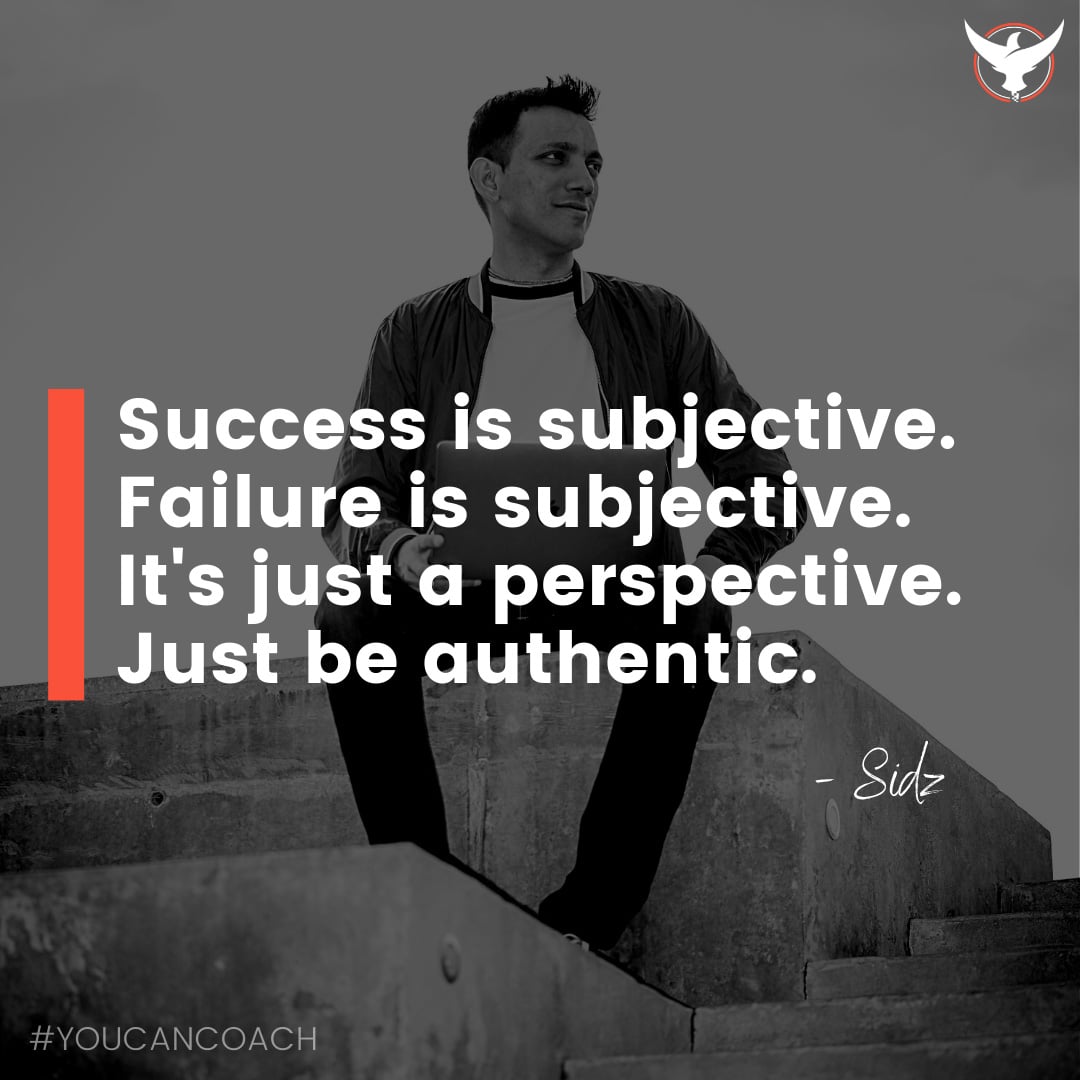
5. Talent goals: Channeling creative energies toward building a connection with the higher energy will give a sense of fulfillment.
6. Contribution Goals: We can only give when we have enough. Giving makes us feel like we have enough, and that reinforces fulfillment.
Your vibe attracts your tribe. When you raise your vibration, you'll attract like-minded people.
Develop a mindset to incorporate spirituality into working towards our materialistic goals:
1. Don’t get attached to the results; rather, focus on the tasks to be done to reach the goals. Efforts from your side and grace from the higher form are what will decide when and how much we achieve our goals.
2. Expose your family to spiritual energy.
3. Minimalism: Having fewer materialistic possessions and a sense of detachment from them frees your mind to experience the higher form of energy to a much greater extent.
Experiencing the feeling of fulfillment is the best way to move forward and have a sustainable business. Hence, making efforts to connect our world with spirituality is the surest way to have long-term success.
Charity
The act of giving to those in need, can be an important aspect of spiritual and personal growth. For a coach, incorporating acts of charity can serve as a way to cultivate compassion, generosity, and empathy for others. It can also provide a sense of purpose and meaning, as giving to others can help create a sense of connection and community and create a ripple effect. You've got to give first that, which you wish to receive.
If you're very tightfisted with money, don't expect money to come into your life. You need to have the right value system to be able to utilize that tool or energy in the best possible way. There's a concept called Arigato Money, popularized by Ken Honda, the author of a book called Happy Money: The Japanese Art of Making Peace With Your Money.
Honda interviewed over 40 Japanese millionaires. And he's come up with a principle called the money principle. The Arigato money principle was very simple. It's being in a state of gratitude when you're giving money to others or even receiving money. What is this technique? The technique is extremely simple. Whenever you have an inflow of money, you accept it with love and gratitude, no matter how small or large the amount is. And you do the same while spending money, that is, with an open heart and with gratitude. Gratitude should transmit energy. And with that energy, you'll also see the money coming back. The flow will happen only when you can consciously look at money as a form of energy. Giving money is like a blessing. When you can constantly do this, you will start to see some shifts in your internal energy because giving more to charity actually shifts your internal energy. You'll be moving away from an energy of desperation to an energy of contribution. When you're building your business in that spirit of contribution, the people who are interacting with you or learning from you will connect with you as a person. They'll want to give you more money because of the energy that you emit. So it's a very subtle thing. It's a very counter-intuitive process to figure out how to give more money to make more money. You've got to be in that zone of contribution. If you're going to be in that zone of contribution, you need to be giving to charity regularly.
Charity can also be seen as a way to honor the principles of wellness, which often emphasize themes of service, compassion, and interconnectedness. By giving back to others, a coach can help bring these principles to life and make a positive impact on the world around them.
However, it is important to note that charity should not be seen as a requirement for coaching, nor should it be used as a way to manipulate or exploit clients. If a coach chooses to engage in charitable activities, it should be done with the intention to help others and make a positive impact rather than for personal gain or recognition. Additionally, it is important to be mindful of boundaries and ethical considerations when doing any sort of charitable work and to ensure that it is done in a way that is respectful and supportive of those who are being helped.
The new aspirations of the community in which members strive to be
Self-educated
Highly skilled
Emotionally intelligent
High energy
Focus on internal control and pays little attention to external
Work from anywhere
Build social leverage
Spiritually grounded.
